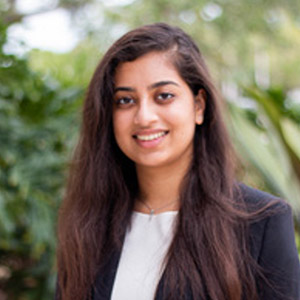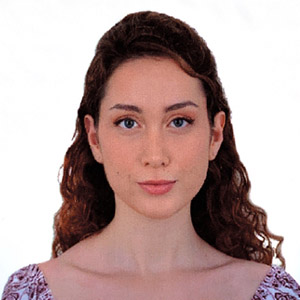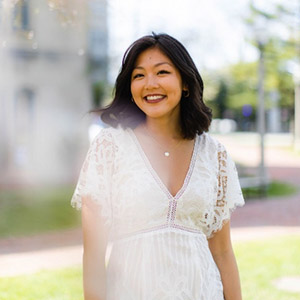Blavatnik Doctoral Fellows: 2019-2020 Cohort
Divya Bhansali, Department of Biomedical Engineering

Divya Bhansali, a graduate of the University of Miami, joined the Biomedical Engineering Department this fall. She has worked on several research projects including developing a "Heart on a Chip Platform" at the Miller School of Medicine, building a semi-autonomous platform to segment and optimize 3-D ultrasound data at MD Anderson Cancer Center, and studying antibody mediated activation of Toll-Like Receptors at UT Southwestern. She has also been heavily involved in volunteer efforts and has served as president of UM's Engineers Without Borders Chapter overseeing two international projects, and as a two-term president of UM's Engineering Student Council. Her research interests lie in drug delivery, human development, and cell and tissue engineering.
Update from Divya Bhansali on this past year at Columbia Engineering:
In the past year, under the mentorship of Dr. Kam Leong, I have begun a project focused on studying drug delivery systems for oral cancer and pain, in collaboration with the School of Dentistry at NYU. This project is allowing me to hone my skills in scientific thinking and train me to think about tough but important problems critically and independently. I will be presenting a poster on this at the Biomedical Engineering Society National Conference in October. I am also the first author on a review paper on the current and future nanotechnologies for pain treatment, which will be published this fall. In addition, I have been working on a project addressing breast cancer metastasis and working to develop ideas for corona-virus vaccines. At Columbia, I currently serve as Philanthropy Chair for the Graduate Organization of Biomedical Engineering (GoBME) where I am responsible for organizing and managing fundraising, donation, and volunteering based events. During the COVID-19 crisis in NYC, I found both local and remote volunteering opportunities for our students to be able to give back to our community during a dire time. I am also organizing outreach events through BioBus for and looking to expand to the local Harlem community. As a graduate student, I also plan on mentoring high-school and undergraduate students in the lab, introducing them to scientific research, and teaching them new techniques. In line with the outreach program being developed with GoBME, I took the position of Graduate Student Representative on the Columbia BME Diversity, Equity, and Inclusion Committee, to help tackle important issues including faculty and student diversity and recruitment efforts; student engagement, mentoring, and recognition; strategic partnerships with other institutions and organizations; and integration of diversity into research initiatives and operations. This has been a very meaningful position as it gives me a platform to help address the needs of underrepresented minorities, the LGBTQ+ community, and women in STEM within the college with the administration. On a college-wide level, I serve as a departmental representative and finance committee member in the Engineering Graduate Student Council (EGSC) where I get to help run a scholarship fund for graduate professional development and organize college-wide events for graduate students. In addition, I am the graduate SEAS representative to the Student Library Advisory Committee.
Christian Cupo, Department of Mechanical Engineering

Christian Cupo has a diverse background which promotes his research interest at the interface of engineering and biology. He entered Columbia University as a Blavatnik Presidential Fellow in the mechanical engineering Ph.D. program, where he is working in the labs of Professors James Hone and Karen Kasza studying organ fabrication, optogenetics and microfabrication. Prior to joining Columbia, he graduated summa cum laude with dual Bachelor and Master of Engineering degrees in mechanical engineering from Stevens Institute of Technology in the spring of 2018. During this time, his primary research focused on nanomaterial fabrication and characterization in the Dr. Eui-Hyeok Yang Laboratory. Upon graduation, he transitioned to a cancer nanomedicine laboratory at Memorial Sloan Kettering Cancer Center (MSKCC) under the mentorship of Dr. Daniel Heller, developing carbon nanotube nanosensors for non-invasively detecting endolysosomal diseases and cancer. Christian extends his passion for engineering using three of his personal 3d printers to create intricate models related to his research to aid in outreach STEM initiatives.
Update from Christian Cupo on this past year at Columbia Engineering:
Much was accomplished in this past academic year because of this very generous fellowship from the Blavatnik Foundation. I completed all of my required academic courses and achieved a 3.92 GPA. In addition, I passed the qualifying examination, which is the first major milestone in the journey to completing my Ph.D. Concurrently, I made major strides in my research. I rotated in both Prof. Hone’s and Prof. Kasza’s laboratories and developed such a passion for both fields that my thesis project of engineering 3D tissue structures will be co-mentored by both professors. Additionally, I was able to complete all of the intensive cleanroom training for fabricating micropatterns and independently finished a project on creating high aspect ratio cell microwells for developing 3D tissue cultures in collaboration with a group at Mt. Sinai. At the same time, I made significant progress in fabricating a microarray of pillars for cell force tracking in the characterization of optogenetic tools. After gaining this initial experience, I was also able to take the lead on several laboratory tours for various outreach programs and inspire students to take part in the summer research opportunities offered by Columbia.
In spite of recent events, I was productive this spring too and was able to analyze experimental data that had been collected before the university ramp-down, which will be included in a forthcoming manuscript on which I will be a co-author. Furthermore, I was able to start applying for fellowships that would cover my tuition, stipend, and fees after my current fellowship expends.
In my remaining time at SEAS, I will continue to direct my research towards integrating the fields of optogenetics and microfabrication to engineer synthetic organs through tissue folding (Origami). The recent time away from the lab has provided me a serendipitous opportunity to clarify the objectives of my project and comprehensively outline the experiments to be performed.
Likewise, I will continue to hone my technical expertise in the mechanical, biomedical, and chemical engineering fields through collaborations with other research groups, presenting my research at interdisciplinary conferences each year and by attending the weekly seminars in the respective departments. Also, I am currently mentoring two undergraduate students which has allowed me the opportunity to not only share my passion for my project, but also learn with them as this original project moves forward. I will continue to mentor many more students in my time at SEAS to help students develop a passion for research.
Ipek Gokulu, Department of Chemical Engineering

Ipek S. Gokulu is a PhD student at Columbia University in the department of Chemical Engineering. She graduated from TED Ankara College Private High School in 2014 where she completed the International Baccalaureate Diploma Program. After high school, she graduated from Koc University with a double major in Chemical & Biological Engineering and Industrial Engineering as the first ranking student in her department in 2019. She conducted research projects and published a paper and a book chapter on biomimetic materials, nanomaterials and tissue regeneration during her undergraduate education. She started her doctoral studies as a PhD student and Blavatnik Presidential Fellow at Columbia University in September 2019. She joined the Banta Lab in January 2019 and is currently working on a project to explore the impact of applied forces on the activity of a model thermostable enzyme using DNA based methods.
Update from Ipek Gokulu on this past year at Columbia Engineering:
I am proud to complete the 2019-2020 academic year as Blavatnik Presidential Fellow in the Department of Chemical Engineering at Columbia University. During the first half of this academic year, I have mainly focused on my classes and getting to know the prestigious faculty and research groups in my department to decipher which would best suit my academic skills and interests. As a result, I completed the Fall 2019 semester with a 3.92/4.00 GPA and joined the Banta Lab with Professor Scott Banta. I thought that working with Scott Banta and his group as my PI and research group was the best match for me both because I saw a substantial area of growth for my scientific vision and because aspired to work on protein and metabolic engineering for a long time. I started to actively work on my first project which is called “Exploring the Impact of Applied Forces on the Activity of Alcohol Dehydrogenase D (AdhD) from Pyrococcus furiosus Using DNA Tweezers” in the end of January 2020. Our main objective in this project is to successfully demonstrate the dynamic and controllable changes in catalytic activity that can be achieved by altering applied forces to the enzyme during catalysis. Accordingly, I worked on protein modeling and site directed mutagenesis in the first half of Spring 2020 semester while concentrating on my classes. I have passed all of my classes which were mainly focused on biopharmaceutical production and industry with high grades and maintained my GPA as letter grading was not effective in Spring 2020 due to COVID-19 regulations. I have not been able to go into the lab due to the same lockdown regulations in the second half of the Spring 2020 semester and the beginning of summer. Thus, I have focused on protein modeling and engineering algorithms in order to optimize the protein structure and DNA attachment points for achieving the best possible results once the labs reopen. As NYC recently went into Phase 2, I have now returned to the lab and hope to complete this project during the next academic year with accelerated progress. I hope and aim to be involved in many more projects related to biochemical engineering and improve myself until I graduate with a PhD degree from Columbia University as a Blavatnik Presidential Fellow.
Olivia Powell, Department of Biomedical Engineering

Olivia Powell joined the doctoral program in Biomedical Engineering this past fall. A graduate of the University of Delaware, she completed a Bachelors of Mechanical Engineering and her honors thesis, “Developing a passively driven storage platform for droplet-based microfluidic virology experiments.” She has joined Biomedical Engineering Professor Nandan Nerurkar’s Morphogenesis and Developmental Biomechanics Lab to study the physical mechanisms that influence the development and behavior of cells and tissues, and contribute to disease pathogenesis.
Update from Olivia Powell on this past year at Columbia Engineering:
Over the course of my first year, I have been investigating the molecular and mechanical cues that drive foregut development in the chick embryo. Concepts from continuum fluid mechanics, developmental biology, and computational modeling SEAS graduate courses have complemented my project and helped me make strides towards my research goals. During recent months, I have also participated as a guest speaker and mentor to high school students interested in science and research through the Hypothekids program. Ultimately, I aim to devote the rest of my time at SEAS to understanding the underlying mechanisms of early development, as well as the respiratory and digestive congenital birth defects that occur when those processes go awry.
Fay Wang, Department of Biomedical Engineering

Fay is a Ph.D. student in biomedical engineering. She graduated from Boston University with a degree in biomedical engineering, where she worked on several projects related to biomedical optics, such as creating an imaging device to aid in assessing melanomas, and using spatial frequency domain imaging in preclinical breast cancer studies. Fay joined Professor Andreas Hielscher and his Biophotonics and Optical Radiology lab, where she plans to continue her research in biomedical optics and breast cancer. Currently, they are working on a bra that can be worn by breast cancer patients in the clinic to monitor their chemotherapy response. As a graduate student, she hopes that she can continue to develop novel optical technologies like these and translating them to the clinical setting.
Update from Fay Wang on this past year at Columbia Engineering:
My first year as a Ph.D. student has been very exciting, and I am incredibly thankful for all the experiences I have gotten so far. I was able to image breast cancer patients in our clinical study at CUIMC using both a conventional Diffuse Optical Tomography (DOT) system and the bra imager that was developed in our lab. Interacting with the patients was a bit intimidating at first, but I found that I rather enjoyed it once I got comfortable. I was also able to present the development of our bra at a virtual conference for The Optical Society. It was great to be able to represent my lab, listen to the feedback of others in my field, and watch and learn from the other presentations. I look forward to continuing our clinical work at the medical center (once COVID-19 passes), continuing to develop our imaging technologies, and hopefully publishing my first paper in the near future.
Besides research, I have made a lot of great friendships through classes, graduate student events, and intramural sports. I feel as though I have a strong support system here at Columbia, and I look forward to spending the next few years with everyone at SEAS. Currently, I am preparing for my qualifying exam. So, if all goes well, I will officially be a Ph.D. candidate and I can begin to develop a research proposal for my thesis!
